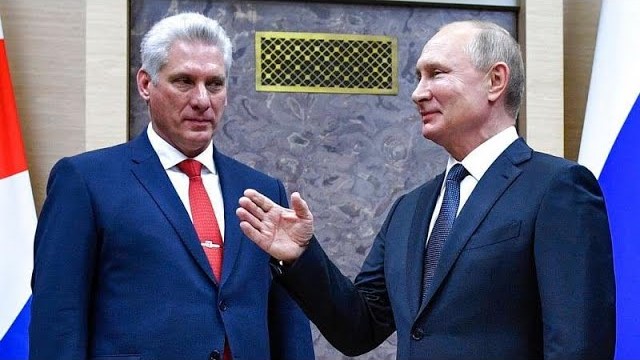It has been several months since the Cuban regime celebrated the strengthening of its alliance with Moscow, announcing a series of economic reform measures endorsed by the Kremlin, and the arrival of a Russian Navy vessel to the Bay of Havana.
But, what do Cubans think of this renewed friendship? Can reality offset their alleged nostalgia for the times of the USSR?
A survey carried out on the island by the Cubadata project disclosed that, according to the Cubans consulted, among the main reasons for the strengthening of that alliance is that Moscow wishes to strengthen its geopolitical presence in Latin America (17.6%), while 14.2% believe that Havana needs financial and economic support, due to its internal situation. 11.8% believe that Russia is looking for new markets for its products in the face of western sanctions.
From the above, it is clear that Cubans do not swallow the narrative advanced by Havana that the "revived friendship" is due to efforts to exercise sovereignty and the self-determination to establish alliances, or out of disinterested solidarity.
Only 8% believe Russia seeks to support Cuba in its challenge to sanctions and international isolation, while 10.1 percent say both governments need to evade U.S. sanctions on the trade in dollars.
In fact, the alliance received very low grades from Cubans: only 25% (262 respondents) fully agreed with it, while 36.4% (393 respondents) disapproved. Meanwhile, 27.8% (292) were neutral.
This skepticism is evident upon examining agreements already underway or announced: only 19.5% believe that the increase in the teaching of Russian is useful or necessary, and 47.3% say they prefer that other languages, such as English, be taught.
Along the same line, only 15.5% of respondents believe that the alliance between Cuba and Russia will generate progress for Cubans in general. 44.1% think that this benefit will only be for an elite, and 13.4% say that it will not bring any progress at all.
Despite being bombarded by Kremlin propaganda, the Cubans consulted have a fairly accurate perception of what Russia is like as a state: 29.8% believe that its political model is authoritarian; 14% believe that it is a mixed system; only 13.0% qualify it as democratic, and 43.2% admit to not being sure.
As for the invasion of Ukraine by Russia, it is surprising to note that in the Cubadata survey 42.5% of those consulted did not consider it legitimate, and just 13.7% approved of it. In this section, a significant 19.7% preferred not to respond, while 24.1% said that they did not know.
The survey was conducted from June 15 to June 30 in all the provinces of Cuba, asking 1,029 people, more than 75% of them between ages 22 and 55. The results show, once again, that the Cuban regime is pursuing policies that favor the island's elite, no matter how unpopular they may be.
